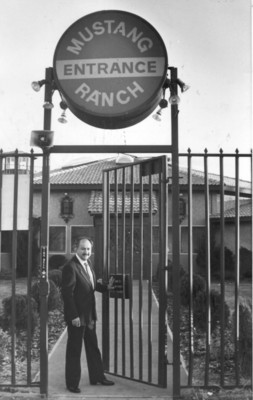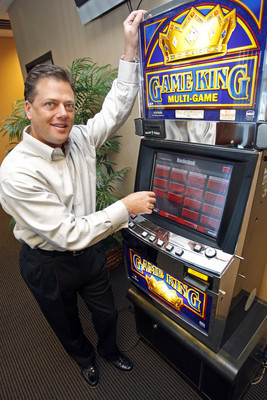Going public not easy
Even if sex sells, SIN has had a hard time finding a market.
Just ask former brothel owner Joe Conforte.
Conforte and his Mustang Ranch near Reno tried to sell shares in SIN Corp. to the public four times. The effort failed each time, most recently in 1990.
Selling shares to the public remains the ultimate dream for many business owners, because it can provide capital to help a company grow. Going public also provides liquidity to shareholders who can generally sell shares on a moment's notice. Owners of private companies, on the other hand, typically find it difficult to sell portions of their ownership stakes.
"The lifeblood of a small startup company is money, and, absent a rich relative, you have to raise it," said Russ Roth, chairman of Las Vegas Gaming, a casino game management system operator.
"You know when you start this process you're going to meet the devil," said Roth, who also held CFO positions at art auction company Sotheby's Holdings and Cessna Aircraft Co.
For companies thinking about going public, the devil is in the regulatory hassles, the higher costs of running a public company and the higher liabilities for officers and directors.
Consider James Bradham, Nevada Bank of Commerce chairman.
In 1991, Bradham took American Bancorp public. He found himself spending half his time talking with shareholders and institutional investors who had short-term interests in the company. Bradham said many institutional investors "have no personal interest at all."
"You're just a chunk of shares they own or want to own," he said.
Institutional investors asked him to predict the next quarter's earnings, which his attorney warned him not to do. Others wanted to know why the stock went up 5 percent in value or -- even worse -- why it went down 5 percent.
"That's just part of your wasted time," Bradham said. "The rest is with the SEC."
The Securities and Exchange Commission requires public companies to disclose events and financial results at regular intervals.
The regulatory duties can be so onerous, "you're not getting business done," he said. "You're not getting loans. You're shuffling paper to be in compliance (with the SEC)."
Deliverance came about six years later when American Bancorp was acquired by Salt Lake City's First Security Corp., which was bought later itself.
"If the bank hadn't been sold in '97 we would have delisted because of the time and expenses," Bradham said.
When Bradham was organizing Nevada Bank of Commerce seven years ago, he told investors they would need to replace him first if they ever decided to go public.
Business owners who decide to go public have several choices.
They can issue shares traded on the Pink Sheets, which does not require the company to file public reports on operations and finances. Companies with shares traded on Pink Sheets face the fewest regulatory requirements.
The next step up the regulatory ladder is the Over-The-Counter Bulletin Board, which requires companies to report their quarterly financial results and important developments.
Farther up the IPO chain is the Nasdaq Capital Market, formerly known as the Nasdaq SmallCap Market, Nasdaq National Market and the American Stock Exchange.
The pinnacle for public companies, some observers say, is the New York Stock Exchange. NYSE stocks typically are traded in large volumes every day, volumes so high that even large investors can buy or sell a stock without making the price move in response to their transactions.
Companies wishing to go public typically find an investment banking firm or firms to underwrite their stock offerings.
One variation of this is called a reverse merger. It's becoming a popular way to reduce the costs of going public, said Kyleen Cane, a securities lawyer and a Las Vegas Gaming director.
In such a transaction, the company will sell shares through Private Investment in Public Equity, or PIPE. The company then buys the corporate shell of a defunct public company to operate its business under.
"It's a great way of taking a company public and getting investor money," she said.
Mike Shustek took his private lending firm, Vestin Group, public through a reverse merger in 1998 with a shell called Sunderland Corp. He then took the company private again in 2007, mostly because the expenses for a public company were too high.
"It was just too hard to get a following (on Wall Street)," said Shustek, who already owned 74 percent of the shares when he went private again.
Shustek still operates two publicly held real estate investment trusts, Vestin Realty Mortgage I and II.
The trusts, previously limited liability companies, gave investors a way to sell their shares.
However, when the LLCs were converted into Nasdaq-listed REITS, some shareholders objected and sued, a further example of some of the headaches associated with going public.
Stephen Brock, CEO of Public Company Management Corp. of Las Vegas, is promoting another way to go public -- direct public offerings. A Nevada company can raise $1 million by registering its offering with the state and selling shares to Nevada residents and visitors.
The company can sell shares itself without an underwriter, which Brock considers an advantage.
Companies can use the same process in other states, but such stock offerings can easily be derailed and cost more, said state Sen. Bob Beers, R-Las Vegas, vice president of marketing for Public Company Management.
After completing that process, the company needs to find a "market maker" for the company before filing a form with the SEC and getting posted on the Over-The-Counter Bulletin Board. A market maker is a securities dealer that stands ready to buy or sell a company's shares when needed.
Going public helps gives companies name recognition, because their shares immediately start to pop up on Web sites such as the one Google has for investors, Beers said.
"When you're a privately held company, no one knows who you are," Beers said. "When you're a small company, one of the struggles is to get the world to notice you."
Brock also mentioned one big drawback: Starting Dec. 15, companies traded on the OTCBB will be required to meet some of the requirements of the 2002 Sarbanes-Oxley Act. That will increase costs.
Cane estimates that a relatively inactive, simple OTCBB company, such as a company pursuing an option for a mine, might spend less than $10,000 a year for lawyers and accountants.
An active business could expect to pay $60,000 to $75,000 for lawyers and accountants. After Dec. 15, she said, OTCBB companies can expect to pay up to twice as much to comply with securities laws.
Not everyone thinks the OTCBB is a good place to start. Being on the board does not help raise capital, create a market for the stock or enable owners to diversify their risk by selling some of their stake in a company, said Mark Ziebell, a Snell & Wilmer securities lawyer in Orange County, Calif.
"Once you get on the bulletin board, that doesn't necessary translate into your being able to raise money," Ziebell said. From an investor perspective, he said the OTCBB is "the wild, wild West."
Western Alliance Bancorporation, the holding company for Bank of Nevada and banks in California, made one big jump from private company to the NYSE.
The company raised $90 million in its initial public offering in 2005.
The two biggest shareholders -- William Boyd, chairman and CEO of Boyd Gaming Corp., and Robert Sarver, chairman and CEO of Western Alliance -- didn't need liquidity from having publicly-traded shares, CFO Dale Gibbons said.
"We wanted to have a currency so that we could do acquisitions," Gibbons said.
A bank can make a cash-only acquisition, but the owners of the bank being purchased will be taxed immediately on gains from the sale. Shares can be exchanged in a tax-free transaction.
Also, using cash eats into the capital bank regulators require be on-hand at any time, Gibbons said.
"Transactions that are a combination of cash and stock are most common," Gibbons said.
Bank holding companies that are publicly owned can sell shares to employees in 401(k) accounts, giving workers a sense of ownership.
Western Alliance's IPO went smoothly. The company originally was seeking to sell shares at $19 to $21 a share, but went public at $22. It raised $90 million and issued 15 million more shares than originally planned.
The cost of doing an initial public offering of this size can be enormous, said David Levine, a securities lawyer with Snell & Wilmer in Las Vegas.
A $100 million offering might cost $6 million or $7 million. Securities lawyers may charge $1,000 an hour for their work.
Silver State Bancorp, a Henderson-based holding company, was trading in the OTCBB when it decided to move up to Nasdaq.
The Henderson company originally proposed to raise $80 million through the initial public offering, but it ultimately raised $26 million.
The company attributed the rough going to bad timing: A Bear Stearns hedge fund that invested in mortgages blew up about the time that Silver State was taking its story to Wall Street investors through a so-called IPO "road show."
Timing is key for public companies. Barry Hulin, former Valley Bancorp CEO, oversaw the $137 million Valley sale to Community Bancorp in 2006.
"I felt pretty strongly that bank stocks were peaking in terms of their value," Hulin said.
Hulin also feared a collapse in subprime residential mortgage loans that are made to home buyers with bad credit ratings. He was right on both counts.
"I knew when (the subprime market) blew up (Las Vegas) would get disproportionately hit and that's exactly what happened," he said.
Sometimes, it's tough for companies to remain listed. Samaritan Pharmaceuticals, which trades on the American Stock Exchange, on July 5 instituted a reverse stock split -- swapping one share for every six shares outstanding.
The idea was to boost the share price to comply with the exchange rule that share prices be above $1 a share. The shares hit $1.31 on July 10 before falling.
Samaritan Pharmaceuticals shares closed at 49 cents Friday, down 3 cents, or 5.77 percent.
Las Vegas Gaming raised capital by selling shares privately even though it technically has been a public company for nine years. Its shares are not traded publicly, but the company files disclosure reports with the SEC.
The company needed to be public, because the alternative was infeasible: All 500 shareholders would be required to obtain gaming licenses if the company stayed private.
Las Vegas Gaming wants to increase its revenue and operations before seeking underwriting so that it can come out with an initial public offering on Nasdaq or the American Stock Exchange, rather than going to the OTCBB first.
CEO Jon Berkley figures investors will be looking for a haven in gaming stocks, because gambling is considered recession-proof and the supply of gaming stocks will be decreasing due partly to recent going-private transactions.
This story first appeared in the Business Press. Contact John G. Edwards at jedwards@reviewjournal.com or (702) 383-0420.


















